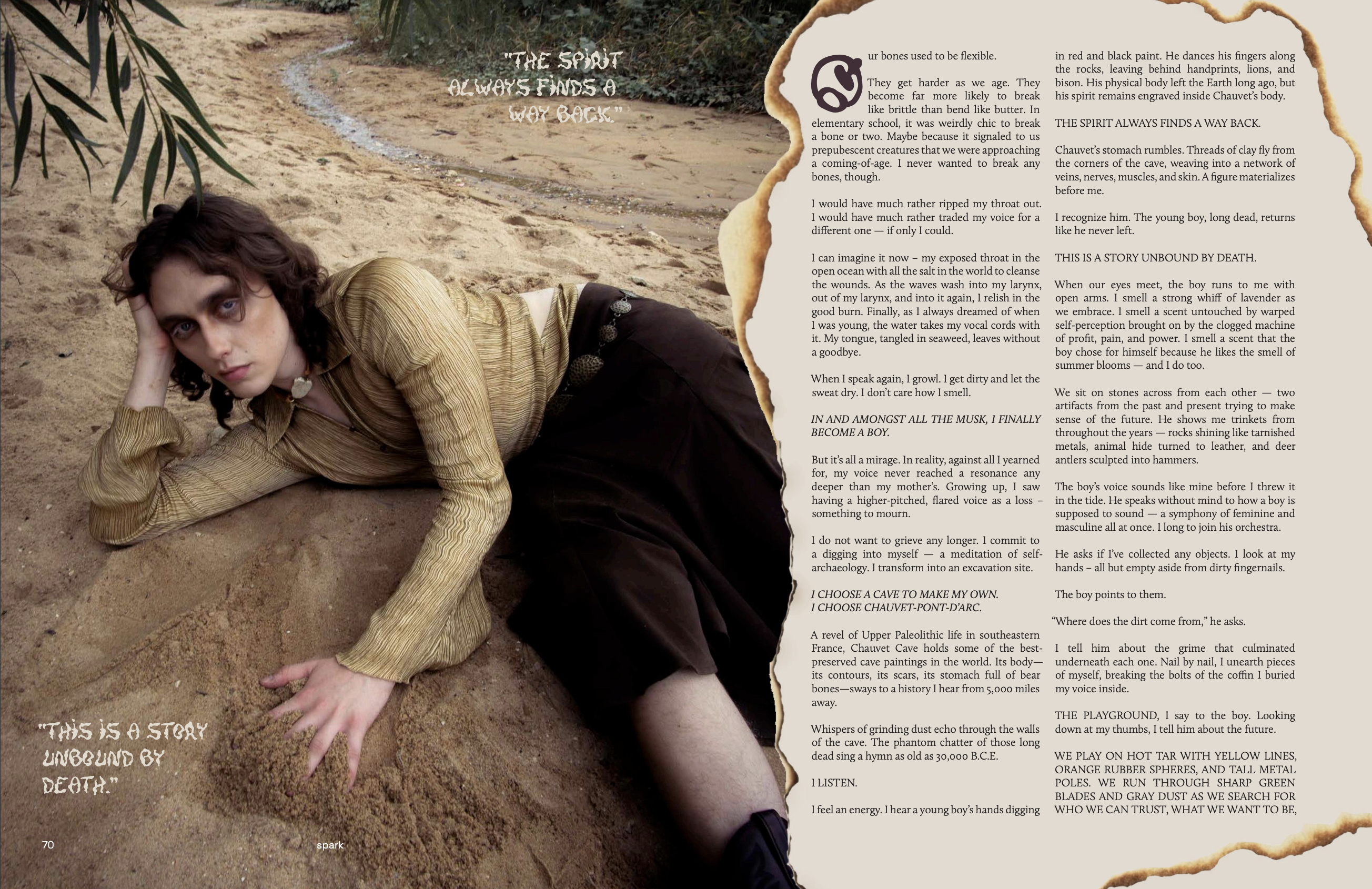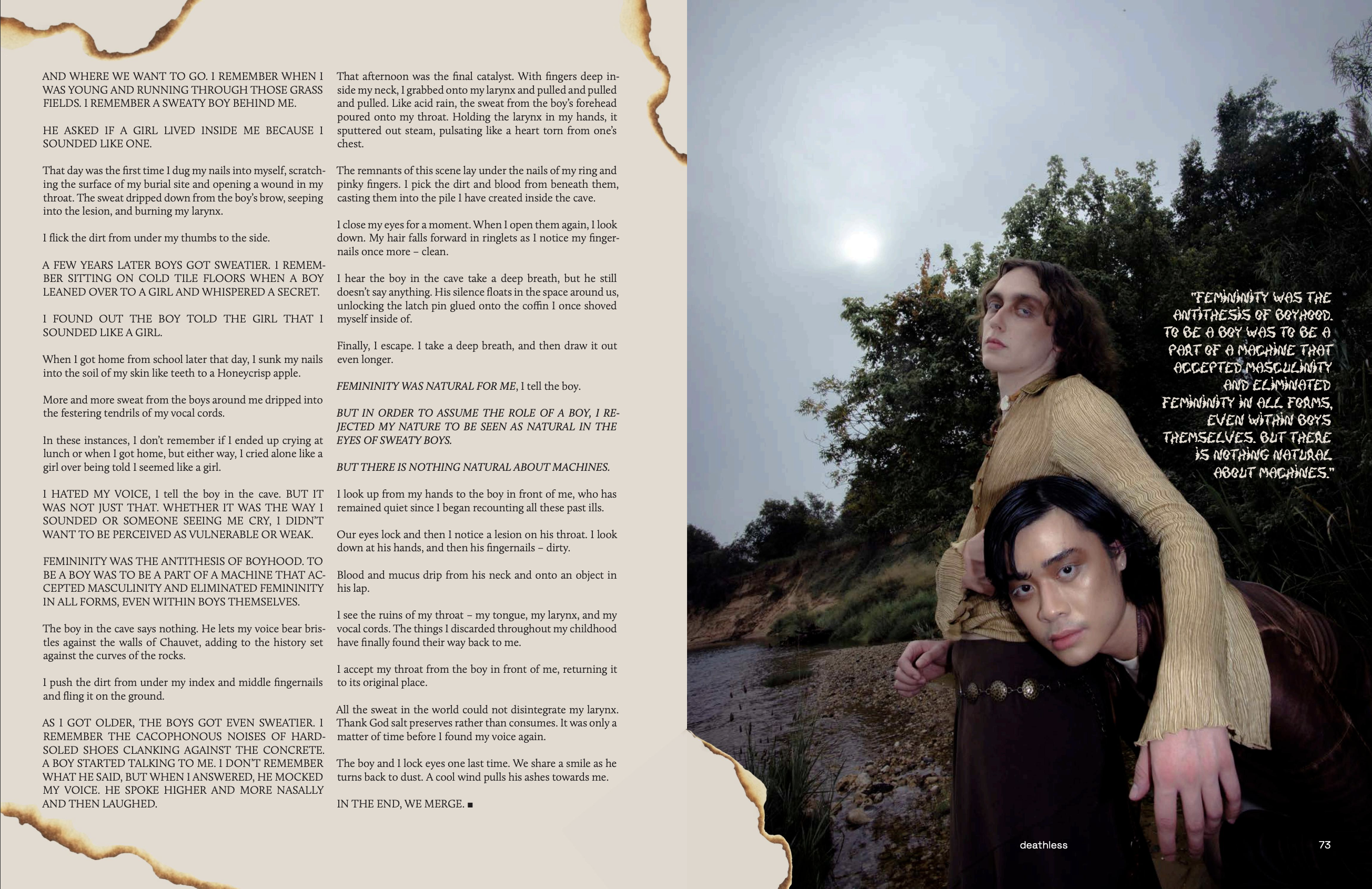In Situ
December 5, 2022

I transform into an excavation site. I pick the dirt beneath each of my fingernails and unearth the boy within me.
Our bones used to be flexible.
They get harder as we age. They become far more likely to break like brittle than bend like butter. In elementary school, it was weirdly chic to break a bone or two. Maybe because it signaled to us prepubescent creatures that we were approaching a coming-of-age. I never wanted to break any bones, though.
I would have much rather ripped my throat out. I would have much rather traded my voice for a different one — if only I could.
I can imagine it now – my exposed throat in the open ocean with all the salt in the world to cleanse the wounds. As the waves wash into my larynx, out of my larynx, and into it again, I relish in the good burn. Finally, as I always dreamed of when I was young, the water takes my vocal cords with it. My tongue, tangled in seaweed, leaves without a goodbye.
When I speak again, I growl. I get dirty and let the sweat dry. I don’t care how I smell.
In and amongst all the musk, I finally become a boy.
But it’s all a mirage. In reality, against all I yearned for, my voice never reached a resonance any deeper than my mother’s. Growing up, I saw having a higher-pitched, flared voice as a loss – something to mourn.
I do not want to grieve any longer. I commit to a digging into myself — a meditation of self-archaeology. I transform into an excavation site.
I chose a cave to make my own.
I chose Chauvet-Pont-d'Arc.
A revel of Upper Paleolithic life in southeastern France, the Chauvet Cave holds some of the best-preserved cave paintings in the world. Its body — its contours, its scars, its stomach full of bear bones – sways to a history I hear from 5,000 miles away.
Whispers of grinding dust echo through the walls of the cave. The phantom chatter of those long dead sing a hymn as old as 30,000 B.C.E.

I listen.
I feel an energy. I hear a young boy’s hands digging in red and black paint. He dances his fingers along the rocks, leaving behind handprints, lions, and bison. His physical body left the Earth long ago, but his spirit remains engraved inside Chauvet’s body.
The spirit always finds a way back.
Chauvet’s stomach rumbles. Threads of clay fly from the corners of the cave, weaving into a network of veins, nerves, muscles, and skin. A figure materializes before me.
I recognize him. The young boy, long dead, returns like he never left.
This is a story unbound by death.
When our eyes meet, the boy runs to me with open arms. I smell a strong whiff of lavender as we embrace. I smell a scent untouched by warped self-perception brought on by the clogged machine of profit, pain, and power. I smell a scent that the boy chose for himself because he likes the smell of summer blooms — and I do too.
We sit on stones across from each other — two artifacts from the past and present trying to make sense of the future. He shows me trinkets from throughout the years — rocks shining like tarnished metals, animal hide turned to leather, and deer antlers sculpted into hammers.
The boy’s voice sounds like mine before I threw it in the tide. He speaks without mind to how a boy is supposed to sound — a symphony of feminine and masculine all at once. I long to join his orchestra.

He asks if I’ve collected any objects. I look at my hands – all but empty aside from dirty fingernails.
The boy points to them.
“Where does the dirt come from,” he asks.
I tell him about the grime that culminated underneath each one. Nail by nail, I unearth pieces of myself, breaking the bolts of the coffin I buried my voice inside.
The playground, I say to the boy. Looking down at my thumbs, I tell him about the future.
We play on hot tar with yellow lines, orange rubber spheres, and tall metal poles. We run through sharp green blades and gray dust as we search for who we can trust, what we want to be, and where we want to go.
I remember when I was young and running through those grass fields. I remember a sweaty boy behind me.
He asked if a girl lived inside me because I sounded like one.
That day was the first time I dug my nails into myself, scratching the surface of my burial site and opening a wound in my throat. The sweat dripped down from the boy’s brow, seeping into the lesion, and burning my larynx.
I flick the dirt from under my thumbs to the side.
A few years later, boys got sweatier. I remember sitting on cold tile floors when a boy leaned over to a girl and whispered a secret.
I found out the boy told the girl that I sounded like a girl.
When I got home from school later that day, I sunk my nails into the soil of my skin like teeth to a Honeycrisp apple.
More and more sweat from the boys around me dripped into the festering tendrils of my vocal cords.
In these instances, I don’t remember if I ended up crying at lunch or when I got home, but either way, I cried alone like a girl over being told I seemed like a girl.
I hated my voice, I tell the boy in the cave. But it was not just that. Whether it was the way I sounded or someone seeing me cry, I didn't want to be perceived as vulnerable or weak.
Femininity was the antithesis of boyhood. To be a boy was to be a part of a machine that accepted masculinity and eliminated femininity in all forms, even within boys themselves.
The boy in the cave says nothing. He lets my voice bear bristles against the walls of Chauvet, adding to the history set against the curves of the rocks.
I push the dirt from under my index and middle fingernails and fling it on the ground.

As I got older, the boys got even sweatier. I remember the cacophonous noises of hard-soled shoes clanking against the concrete. a boy started talking to me. I don't remember what he said, but when I answered, he mocked my voice. He spoke higher and more nasally and then laughed.
That afternoon was the final catalyst. With fingers deep inside my neck, I grabbed onto my larynx and pulled and pulled and pulled. Like acid rain, the sweat from the boy’s forehead poured onto my throat. Holding the larynx in my hands, it sputtered out steam, pulsating like a heart torn from one’s chest.
The remnants of this scene lay under the nails of my ring and pinky fingers. I pick the dirt and blood from beneath them, casting them into the pile I created inside the cave.
I close my eyes for a moment. When I open them again, I look down. My hair falls forward in ringlets as I notice my fingernails once more – clean.
I hear the boy in the cave take a deep breath, but he still doesn’t say anything. His silence floats in the space around us, unlocking the latch pin glued onto the coffin I once shoved myself inside.
Finally, I escaped. I take a deep breath, and then draw it out even longer.
Femininity was natural for me, I tell the boy.
In order to assume the role of a boy, I rejected my nature to be seen as natural in the eyes of sweaty boys.
But there is nothing natural about machines.
I look up from my hands to the boy in front of me, who has remained quiet since I began recounting all these past ills.
Our eyes lock and then I notice a lesion in his throat. I look down at his hands, and then his fingernails – dirty.
Blood and mucus drip from his neck and onto an object in his lap.
I see the ruins of my throat – my tongue, my larynx, and my vocal cords. The things I discarded throughout my childhood finally found their way back to me.
I accept my throat from the boy in front of me, returning it to its original place.
All the sweat in the world could not disintegrate my larynx. Thank God salt preserves rather than consumes. It was only a matter of time before I found my voice again.
The boy and I lock eyes one last time. We share a smile as he turns back to dust. A cool wind pulls his ashes towards me.
In the end, we merge. ■
Layout: Ainsley Plesko
Photographer: Leah Blom
Stylists: Jeffrey Jin & Fernanda Lopez
HMUA: Yeonsoo Jung
Models: Aaron Boehmer & Laurence Nguyen-Thai
Other Stories in Deathless
© 2025 SPARK. All Rights Reserved.
